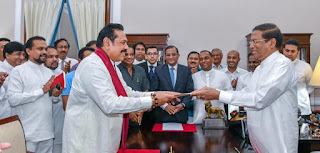 Over three years ago students and lecturers played a key role behind the
scenes in the defeat of Sri Lanka’s former president Mahinda Rajapaksa. But
Rajapaksa is now back as prime minister after a sudden and unexpected move by
the country’s president, Maithripala Sirisena.
Over three years ago students and lecturers played a key role behind the
scenes in the defeat of Sri Lanka’s former president Mahinda Rajapaksa. But
Rajapaksa is now back as prime minister after a sudden and unexpected move by
the country’s president, Maithripala Sirisena.
Sirisena unleashed a political cyclone after he pulled his party from
the National Unity Government, a coalition of parties, on 26 October and later
appointed Rajapaksa as prime minister, joining hands once again with the leader
he ousted in 2015.
Sirisena also issued special gazettes Ranil Wickremesinghe (administrative regulations) to
sack Prime Minister Ranil Wickremesinghe and his cabinet – in a move seen by
many as unconstitutional – and suspended parliament until 16 November.
The storm of events sparked street protests and a heavy social media
campaign by students and young people against the president’s “betrayal” of
voters, while the pro-Rajapaksa camp celebrated sudden victory with fire
crackers and later took control of government media. Clashes were reported in government
institutions where one person was reported killed.
However, Sri Lanka’s major university students’ union seems curiously
inactive despite their previous role in opposing Rajapaksa. Inter University
Students’ Federation (IUSF) convener Lahiru Weerasekara told University World
News the union was “not loyal to any party” and was not happy about the way the
Unity government delivered on past promises.
“The Unity government came to power selling our slogans. They failed to
fulfil their election promises, even for 6% of GDP [gross domestic product] for
education,” he said. Instead, they continued to suppress students. Some 15
legal cases against student leaders on charges relating to protests and damage
of public property during 2015-18 are still pending in the courts.
Fears are already growing among students over the new developments. On
27 October police stormed a university students’ hostel in Dehiwala, close to
Colombo, and launched a search operation, possibly to gauge whether planned
protests were related to the political situation in the country.
Full Article - UWN
www.lankauniversity-news.com
